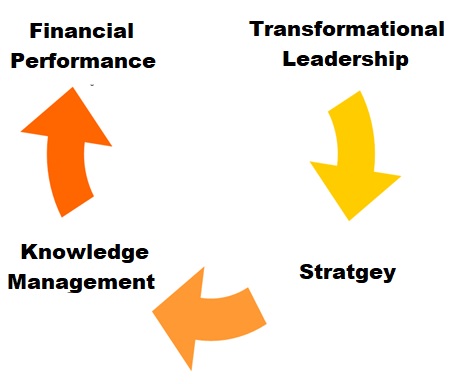Executives are faced with challenging economic conditions today. Transformational leadership is the new competitive advantage and the organizations that embrace it will survive while those that do not will find their organizations facing possible acquisition. Thus, executives must understand that transformational leadership can effectively lead organizational change to successfully implement the projects of knowledge management and, therefore, get amazing financial results.
I indicate that to improve knowledge management effectiveness, leaders, and for the sake of this study transformational leaders, act as change agents who have developed competencies to better deploy corporate strategy. Better use of this organizational factor mediates the relationship between transformational leadership and knowledge management to include aspects that have not been considered by previous studies. I offer a new and unique approach that can be easy adaptable in the workplace. I do this by thoroughly looking the aspects of executive leadership that is explained in the article – transformational leadership, corporate strategy, knowledge management and financial performance.
Corporate strategy includes four dimensions: analysis, pro-activeness, defensiveness, and futurity. Analysis strategy focuses on identifying the best solutions for the organizational problem. Transformational leaders apply this strategy to create more innovative solutions for organizational problems. Pro-activeness strategy emphasizes the effectiveness of long-term decisions. Transformational leaders employ this kind of strategy to develop a vision of adopting more comprehensive information about the future. Defensiveness strategy can also be applied by transformational leaders by taking into account the objectives of strategic implication that seeks to decrease organizational costs and redundancies. While transformational leaders focus on implementing changes, a defensive strategy can be used to modify the current processes to enhance organizational efficiencies. The fourth strategy, futurity incorporates a pro-active strategy that identifies the opportunities that are available but not always addressed in the business, the global environment, and the political regulation changes. This strategy can be also enhanced by transformational leaders as they adopt a strategic posture that inspires employees to identify better opportunities in both the internal and external environment.
Corporate strategy can be employed by transformational leaders to effectively manage organizational knowledge. For example, an analysis strategy could enhance the knowledge creation process through identifying new opportunities in order to provide better alternatives for managers to make a more effective decision. Michael Cohen and Lee Sproull have indicated that the analysis strategy is highly associated with a company’s capacity to create new knowledge.4 In many ways, a proactive strategy could enhance knowledge transfer by developing interactions with both departmental units and the business environment. When adopting a more futurity type strategy, transformational leaders can enhance the knowledge utilization process, thereby developing guidelines for future pathways and determine future trends in the external environment and allocate their resources accordingly. Transformational leaders can, therefore, exploit organizational knowledge through embracing the four strategic aspects of analysis, pro-activeness, defensiveness, and futurity.
Furthermore, knowledge is one important area that plays a critical role and is a strategic prerequisite for improving financial performance in today’s knowledge-based economy. Thomas Beckman explains that knowledge management is the formalization of and access to experience, knowledge and expertise that create new capabilities, enable superior financial performance, encourages innovation and enhances customer value and profitability. [1] Knowledge management is in fact a set of activities and processes aimed at creating value through generating and applying intellectual capital.
Executives agree with Carla O’Dell and Jackson Grayson, who see knowledge management as a conscious strategy of getting the right knowledge to the right people at the right time and helping people share and put information into action in ways that strive to improve financial performance. [2] Executives direct practices that create value from intangible organizational resources. Knowledge management can encourage companies to integrate knowledge and provide new ideas and better solutions for solving organizational problems. Better solutions and new ideas can improve the quality of products and services, which in turn enhances sales, profitability and market share. Knowledge management is, therefore, positively associated with two important factors of product and service quality and customer satisfaction. Executives should analyze the roots of problems to provide the best solutions. And knowledge management can enable executives to acquire skilled human labor and top talent employees who are more solution-oriented. For executives, it is clear that the objective of managing knowledge is to add value to organizations. The focus here is that executives consider the fact a firm’s knowledge is positively associated with its financial success and profitability. Therefore, knowledge management is an important resource that should be embraced at all organizational levels to enable financial performance in globalized markets through integrating knowledge and sharing ideas. And successful companies play a pioneer role in implementing knowledge management projects in order to increase their sales and market share across the globe.
The following figure provides a snapshot of how transformational leadership, strategy, knowledge management and financial performance are linked within companies: How executives can use these findings
How executives can use these findings
Executives can now see how transformational leadership can cultivate a strong strategy, which will enable knowledge management processes within organizations. This is my experience of working with a team of top-level management consultants in the consulting industry. My experience says that a firm’s ability to enhance knowledge management can be highly affected when executives adopt transformational leadership as the primary form of managing people, resources, and profitability. This article also adds to a relatively small body of literature and develops our understanding of the indirect contribution of transformational leadership in improving financial performance through better use of strategy as a primary driver of knowledge management.
This study was designed to find if transformational leaders indirectly influence knowledge management and financial performance through affecting corporate strategy. Previous researchers repeatedly uncovered leadership’s direct impacts on knowledge management and financial performance. This article articulates a different approach. I simply extended the literature by showing how transformational leaders can also contribute to knowledge management and financial performance by fostering an effective corporate strategy. This organizational factor coupled with transformational leadership, knowledge management and financial performance is presented as a new approach for executive implementation.
References
[1] Beckman, T.J. (1999). The Current State of Knowledge Management. In J. Liebowitz, (Eds.), Knowledge Management Handbook, New York: CRC Press.
[2] O’Dell C., & Grayson C.J. (1998). If only we knew what we know: identification and transfer of international best practices, New York: Free Press.
Mostafa Sayyadi is a Senior Management Consultant and Former Leadership Team Member of San Diego-based The Change Leader Consulting Inc. He is an Associate Fellow of the Australian Institute of Management, a Book Author and Business and Technology Journalist.
Did this article help you? If you’d like to surround yourself with global HR Thought Leaders and Experts whose articles will advise you on the best way forward, subscribe to HR Future digital magazine.






















